Samsung Galaxy Z Fold 5 review: Best in the West
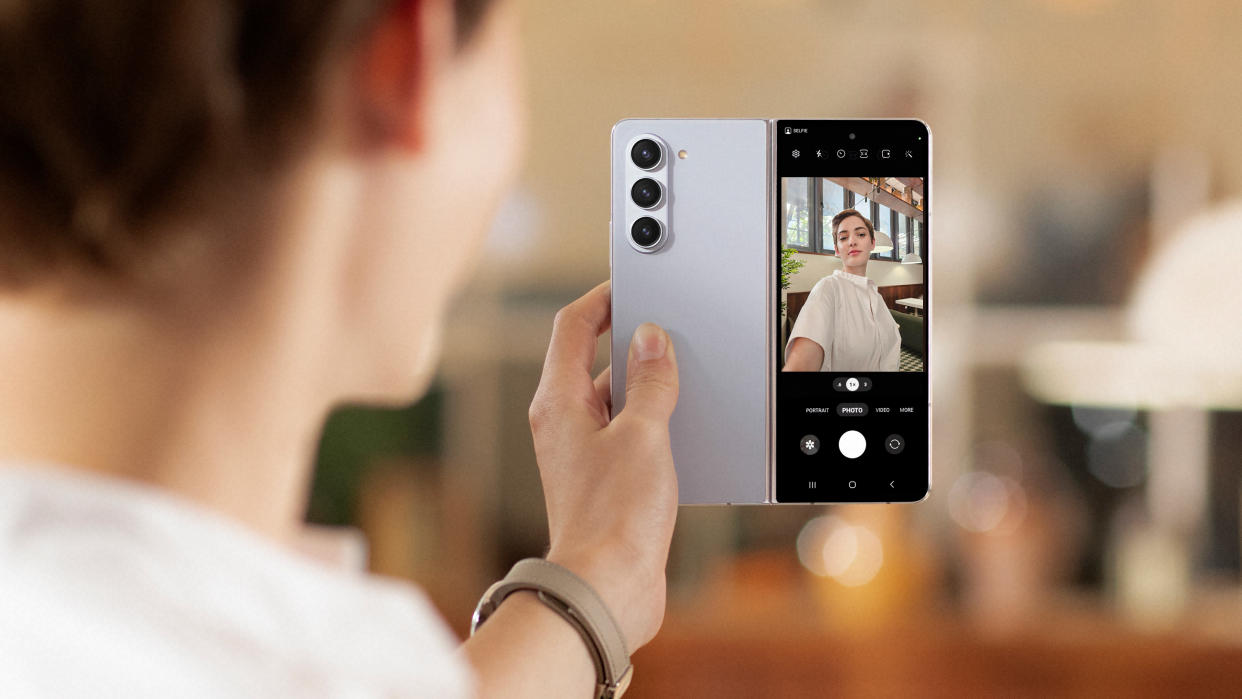
The Samsung Galaxy Z Fold 5's family tree starts with the very first mainstream foldable, the Galaxy Fold, which launched back in 2019. If you compare the Z Fold 5 to the original, the series has come a long way. Since the Z Fold 2, though, Samsung has played things fairly safe, limiting upgrades to incremental design changes and a refreshed set of internals year-on-year.
While Samsung hasn't had much big-screen foldable competition in the West to date, for 2023 it's a different story: the Google Pixel Fold is the Z Fold 5's most mainstream competition, complete with bigger screens throughout; while the Honor Magic Vs is a lower-cost alternative; and rumours are hotting up about the upcoming OnePlus Open, expected in the coming months.
So can more of the same really cut it now that Samsung isn't running a solo race in the book-style best folding phones category? The Z Fold 5 might be about subtle refinement, but it's still the folding phone champion... for now. Here's why.
Samsung Galaxy Z Fold 5: price & availability
The Samsung Galaxy Z Fold 5 starts at £1,749/$1,799 in its entry-level spec with 12GB RAM and 256GB storage. Whichever version you go for, the RAM is the same, at 12GB, though the storage capacity varies.
For £1,849/$1,919, you can double the storage to 512GB, and for an eye-watering £2,049/$2,159, max it out at 1TB. To be fair to Samsung, that top price isn't worlds apart from the non-folding 1TB £1,749 Apple iPhone 14 Pro Max, making both phones prohibitively expensive for most people.
Samsung Galaxy Z Fold 5 review: design
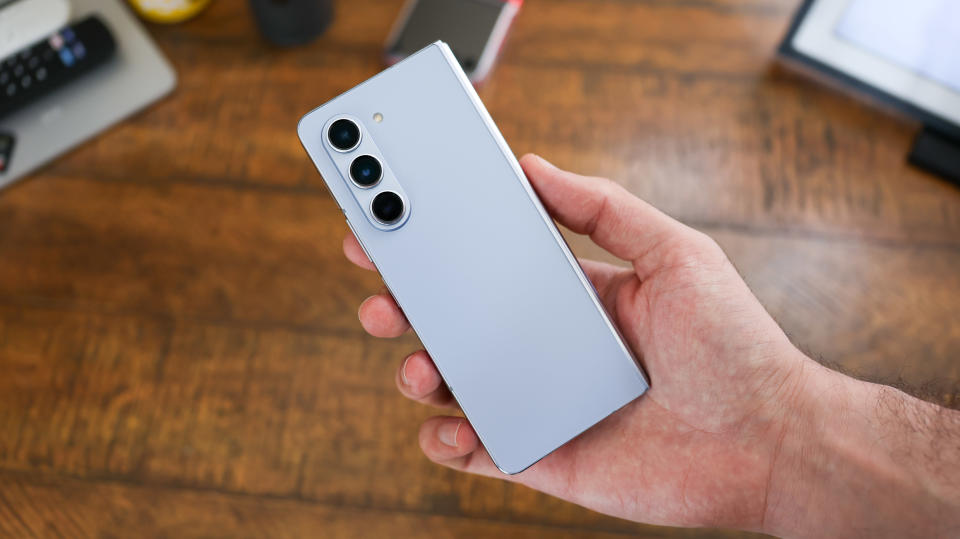
If you've used a Samsung Galaxy Z Fold 2, 3, or 4 before, you'll have a good idea of what to expect from the Z Fold 5's design. A polished frame, matte glass back, and tall body that serves up a narrow cover screen but makes up for it with an expansive inner display.
This is a very well-built phone, and while some foldables we've tested – namely the Honor Magic Vs and Pixel Fold – don't open out completely flat (argh!), Samsung's Z Fold 5 locks into place with a satisfying snap, for want of a better word.
The hinge is the first thing about the Galaxy Z Fold 5 that argues away some of its shortcomings. This phone is much thicker and heavier than the fantastic-looking Huawei Mate X3, and it's chunkier than the Google Pixel Fold, too, but neither of those can hold their position quite like the Z Fold 5, securely throughout the opening and closing range.
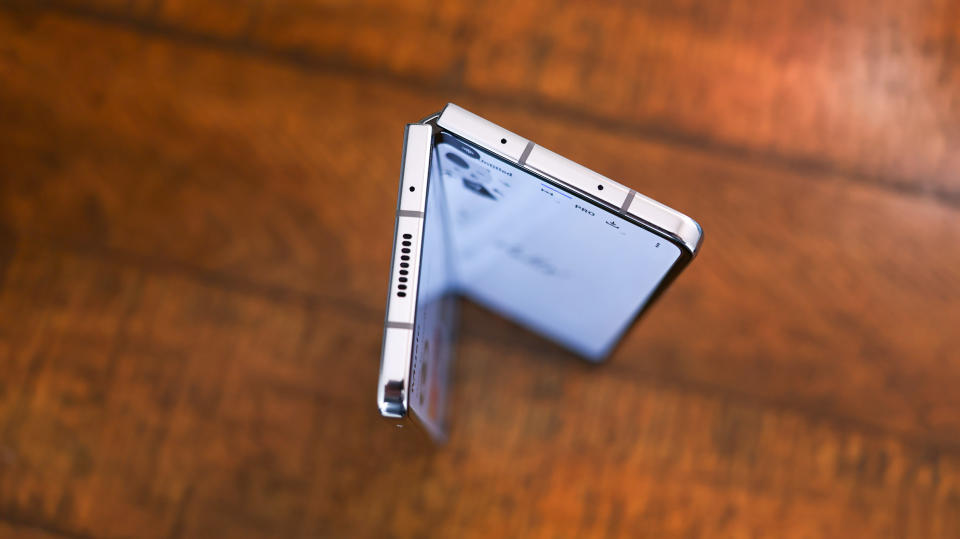
The big news this year is that Samsung has finally closed its hinge gap...ish. While the Z Fold 5 doesn't bring back the wedge-shape that past foldables sported, this isn't a zero-gap hinge, instead described as a waterdrop design (for the 'droplet' shape nearside to the hinge).
Hold the phone side-on against a light source, and you'll be able to see a strip of light peek through it. This isn't unique to the Z Fold 5 – it's the same situation for the Pixel Fold and Honor Magic Vs – but anyone hoping for Samsung to seal off the sides from all dust and debris, well, maybe next year.
What Samsung has done is bring back the IPX8 water-resistance rating introduced on the Z Fold 3, as well as Gorilla Glass Victus 2 on the front and back, making the Z Fold 5 more durable than some key competition.
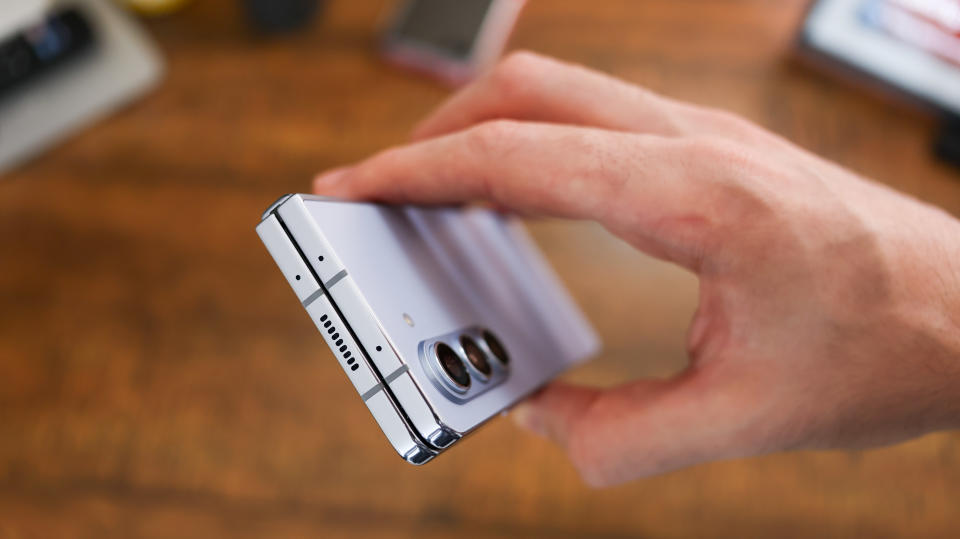
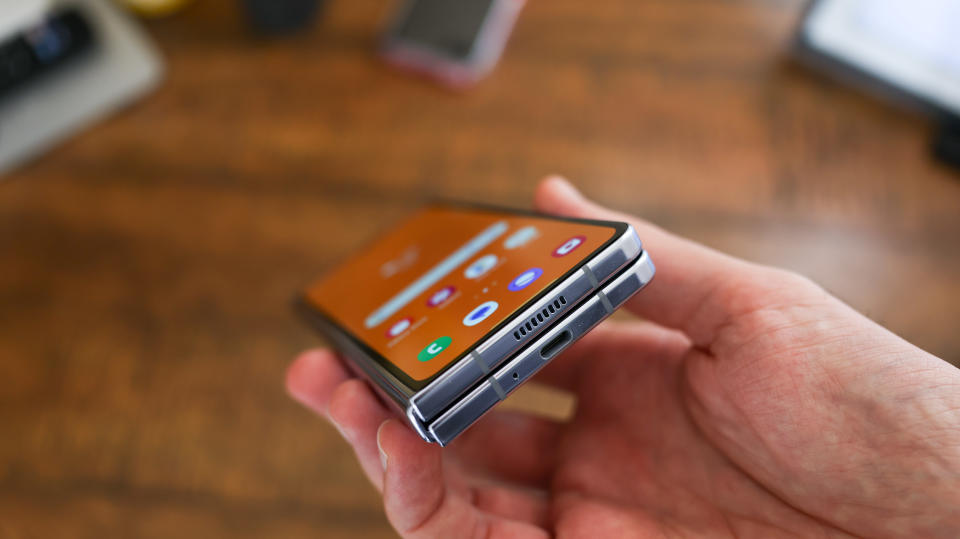
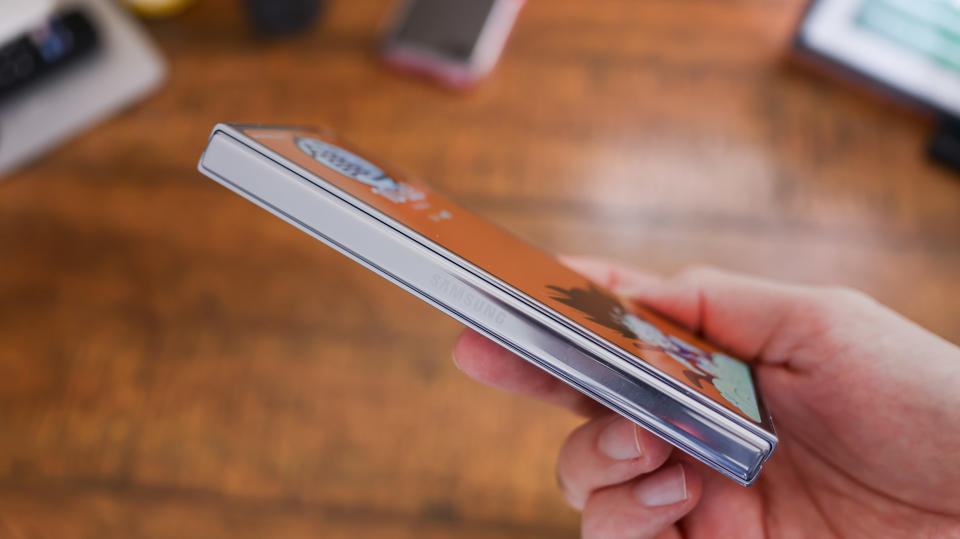
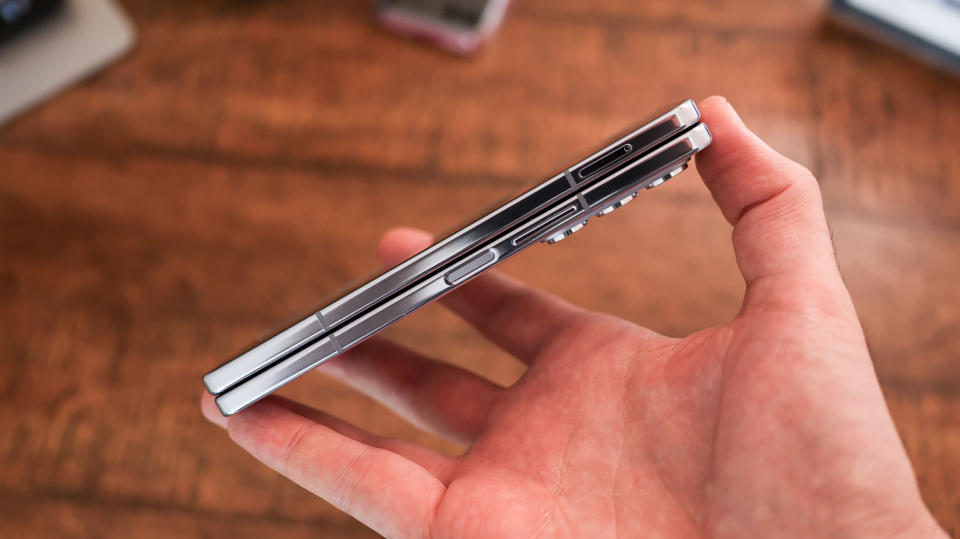
While it's chunky, with a thickness of 13.4mm when closed, the Galaxy Z Fold 5 is narrower than most phones, making it surprisingly easy to grip. Its fascia is significantly smaller than big phones like the iPhone 14 Plus or Samsung Galaxy S23 Ultra, so if you're worried about size, while its thickness and weight might put some people off, its footprint shouldn't.
The Fold 5 is also around the same height as an iPhone 14 Pro Max, so while it's a stretch to reach the top, it's still perfectly usable, especially when you activate one-handed mode.
The USB-C port at the base charges the phone, and there are a couple of speaker grilles on either side of the cover screen too. On the right side is a fingerprint scanner/power button, and a volume rocker, while the dual-SIM card tray is on the left side.
I tested out the Icy Blue version, and its matte, soft-touch glass finish looks and feels superb. It did a great job keeping fingerprints and smudges at bay, and the colour-matched polished frame adds a gorgeously cohesive contrasted texture. If Icy Blue isn't for you, the Fold 5 is also available in Cream and Phantom Black, with more colour options available from Samsung's online store.
Samsung Galaxy Z Fold 5 review: screens & S Pen
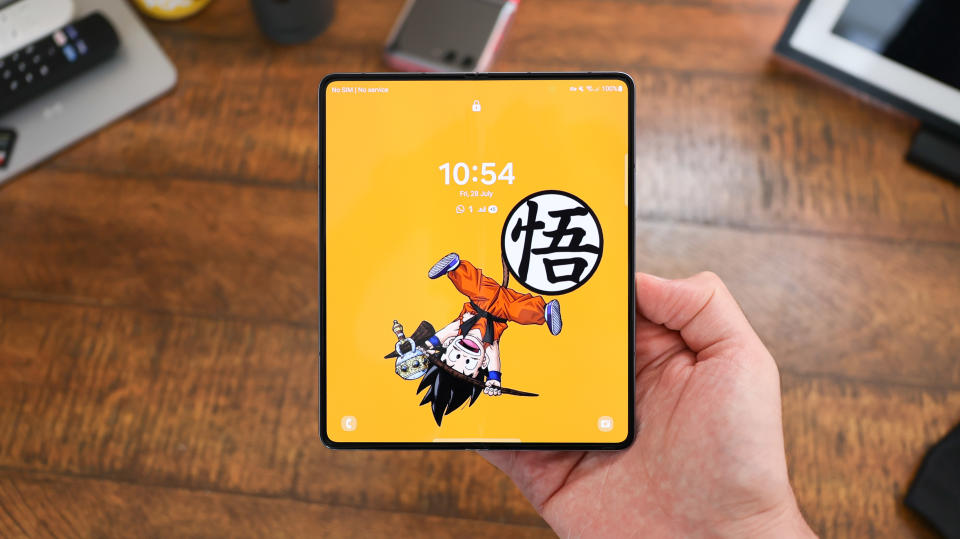
The cover screen on the Z Fold 4 is a 6.2-inch panel that's very tall given its 23.1:9 aspect ratio (sporting a 904 x 2316 resolution). Inside, there's a much more spacious 7.6-inch screen with an 1812 x 2176 resolution.
Both screens have Dynamic AMOLED 2X tech with 120Hz refresh rates, HDR10+ high dynamic range support and are sharp with over 370 pixels in every inch.
After testing the phone both in lab conditions and the real world, in direct sunlight and in a very dark room, the range Samsung's screens offer is exceptional. They beam brilliantly for easy viewing both indoors and out, and get soothingly dim for comfortable bedtime reading.
If you pick up a snazzy S Pen case for your Fold 5, you can only use the stylus pen (sold separately) on the large, main display – not a deal-breaker, but worth noting. The fact Samsung's big screen has a prominent crease line also creates a bump while jotting or doodling on it. But if those two negatives don't put you off, we really appreciate the versatility the S Pen brings, especially when paired with excellent apps like Concepts or the pre-installed Samsung Notes.
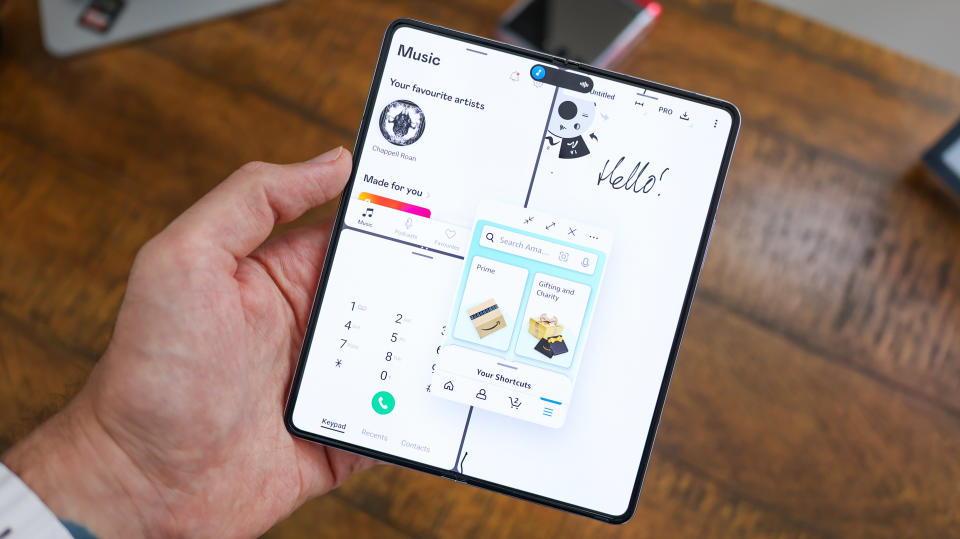
As consistently top-notch as Samsung's AMOLED tech is, the Z Fold 5's displays could definitely be better. Firstly, the cover screen is just too narrow – a common complaint I've hear from many users. I've used hundreds of phones, switching weekly as I go from one review to another, and nothing else cramps my thumbs when two-handed typing quite like the Z Fold cover screen.
The Z Fold 5's selfie camera in the main screen is an under-display module. While we've tested the fantastic RedMagic 8 Pro, and it's demonstrated you can make an actually invisible under-display camera, the Z Fold 5's chunky pixels create a weird, moiré circle (that's especially visible when light backgrounds cover it).
Then there's the crease. When displaying a light colour, the main screen's crease line is hard to notice head-on, though it is still visible from the side. Play back an atmospheric, dark movie, and you can expect any glare to catch the crease's ridges, though, pulling you out of the otherwise immersive experience.
These niggles aside, none are deal breakers, and you'll have to go to China to get your mitts on a phone with a much less prominent crease, with the Oppo Find N2 being the most notable option. Alternatively, the Huawei Mate X3, which can be had in the West, is a design and screen champ – though the lack of Google services and its sky-high price makes it extremely niche.
Samsung Galaxy Z Fold 5 review: performance & battery
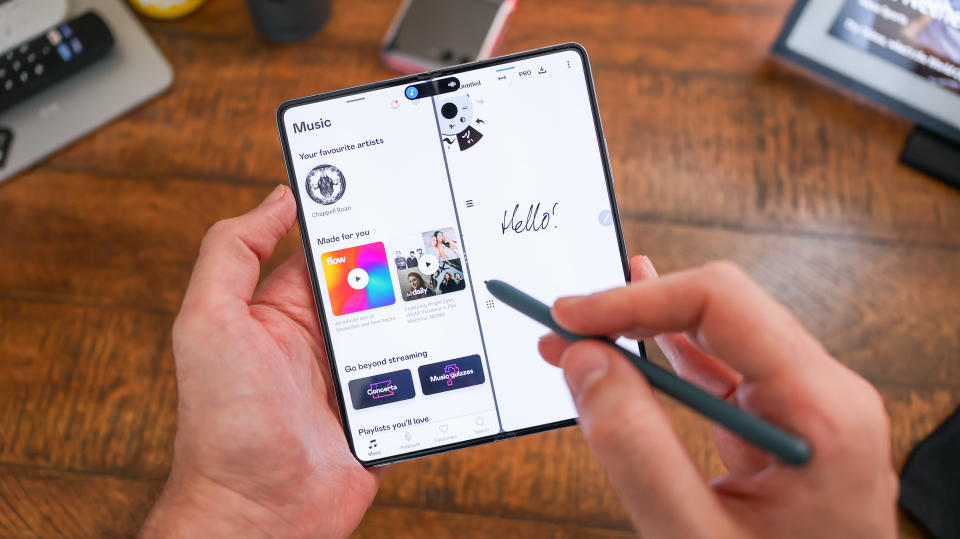
Running with the same power as the flagship Galaxy S23 series, the Z Fold 5 has a tried-and-tested beast of a chip inside (the Qualcomm Snapdragon 8 Gen 2) that keeps games, multi-tasking and 4K video editing performing at the highest level.
Samsung's upgraded the heat management this year, so you can tear through long Genshin Impact and download sessions without the phone getting too hot. This is in stark contrast to the Google Pixel Fold, which ran hot for much of our first few days testing it.
There are a few other reasons the Z Fold 5 is our foldable gaming champion when compared to the competition. It isn't super-easy to cover up the Z Fold 5's speakers, unlike the Pixel Fold. Its screen orientation is also better-suited to services like PS Remote Play, and it fits both our BackBone One and Nacon MG-X Pro controllers well.
Unlike the Honor Magic Vs and Pixel Fold, the Z Fold 5 unfolds nice and flat, making for a solid-feeling panel to game on with touch controls, and thanks to Google Play Store access its gaming library wipes the floor with that of the Huawei Mate X3.

Samsung's also the winner when it comes to making a foldable-optimised interface. Running Android 13 with OneUI 5.1.1, a quick whizz through the cover screen, and it looks like any other Samsung phone on first impression. While you could miss all the smart touches that make this phone a multi-tasking marvel when closed, open it up, and the Z Fold 5 starts to flex its muscle.
There's a taskbar at the bottom of the screen displaying favourite and recently used apps. Drag apps from it for quick split-screen multi-tasking or to create a pop-up, floating window, and dock them like cards on the side of your screen so you can quickly switch between them. This is a massive display of RAM power, with up to five floating windows running on top of three split-screen apps. That's eight apps running on-screen that you can interact with. Even the Pixel Fold can't compete with that (bonkers, really, when Google is the maker of Android OS).
Samsung also includes DeX, its big-screen desktop user interface. While the new tablets like the Galaxy Tab S9 Ultra showcase the smart, Windows-like interface on their native displays, to fire DeX up on the Galaxy S23 you need to connect the phone to a screen. Whether you use an HDMI to USB-C cable for a wired connection or wirelessly project to a compatible display, the DeX experience paired with a Bluetooth keyboard and mouse makes the Z Fold 5 double-up as a serious work tool for much easier document editing and big-screened web browsing.
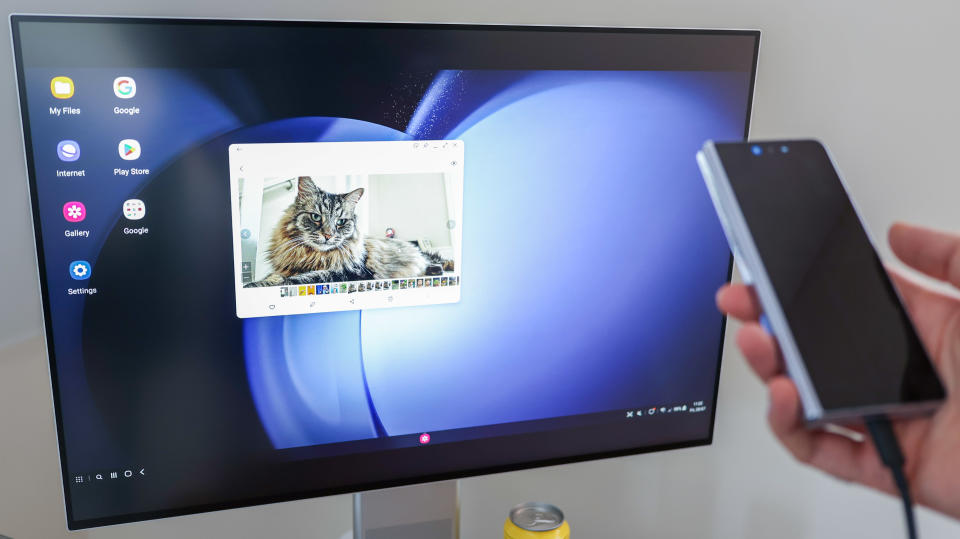
Samsung is also leading the charge when it comes to making the most of the part-folded experience. If you're watching a video on the main screen, fold the phone slightly, and the video will likely jump into the top half of the screen. If your app doesn't automatically jump, then you should still see an option to push your app to the top half, so it's easy to angle the action to face you as you rest your Z Fold 5 on a surface.
As for battery life, while the Z Fold 5's 4,400mAh battery seems modest on paper, with most flagships today packing 5,000mAh or more, we easily made it through a typical day with the phone. This isn't surprising as the 6.2-inch front screen is smaller than a typical top-tier phone display, and we were able to lean on that 80-90 per cent of our time with the phone.
When we did need to fire up the main display, the battery drained faster, especially when screen brightness was maxed out. A 30-minute Netflix episode streaming at full brightness drained the battery by around 6%, though, so you'll still be able to get through a couple of movies without having to charge it up.
Speaking of charging, the Z Fold 5 powers up at 25W wired and 15W wireless, and using the UGREEN 140W PD 3.1 charger, which tops it up at max speed, a 10-minute charge powered it up by 20%; 30 minutes took it to 56%; and a full charge took around 80 minutes. The phone doesn't ship with a power brick, so you'll need to pick one up separately if you don't already have one.
Samsung Galaxy Z Fold 5 review: cameras
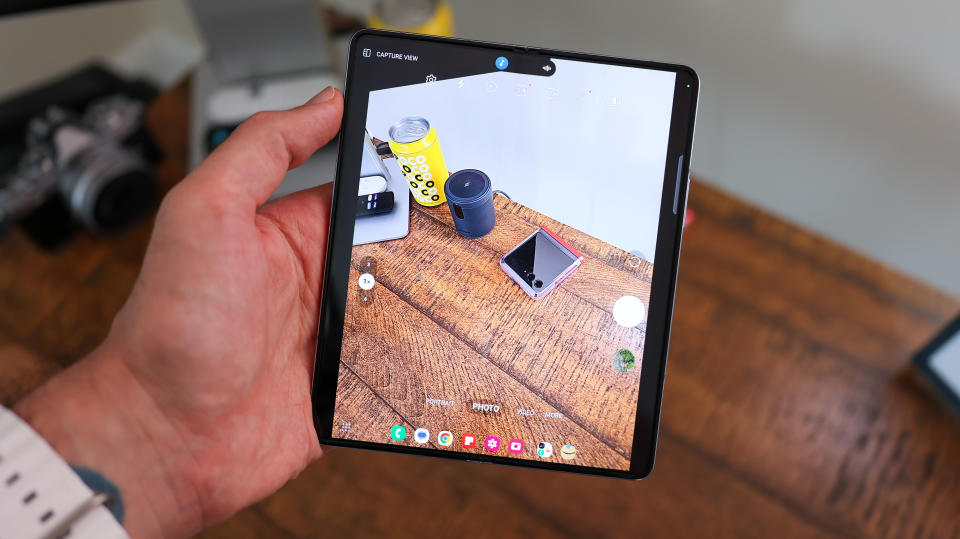
The Z Fold 5's cameras are unexceptional, with the same specs as last year's Z Fold 4. That means there's a 50-megapixel resolution, f/1.8 aperture primary camera with optical stabilisation (OIS), a 10MP, f/2.4 3x zoom camera also with OIS, and a 12MP, f/2.2 ultra-wide camera.
There are two selfie cameras – the 4MP, f/1.8 under-display camera inside and a 10MP, f/2.2 camera on the cover screen.
If you're coming from another Galaxy phone and like the crunchy, punchy, contrast-heavy Samsung photo aesthetic, with brightened-up night scenes and ramped-up colours, then you'll probably really like the Z Fold 5's photos.
As versatile as the camera system is, though, none of the Z Fold 5's cameras are best-in-class, with the Pixel Fold's zoom and photo quality outperforming Samsung's, thanks to further optical reach and more natural processing.
If you're prepared to download Samsung's Camera RAW app and labour over a bit of manual photography, you can get Pixel-beating results from the Z Fold 5, with the 50MP sensor at the helm being relatively powerful and versatile. But for point-and-shoot shots, the Z Fold 5 is generally good but seldom great given its price.


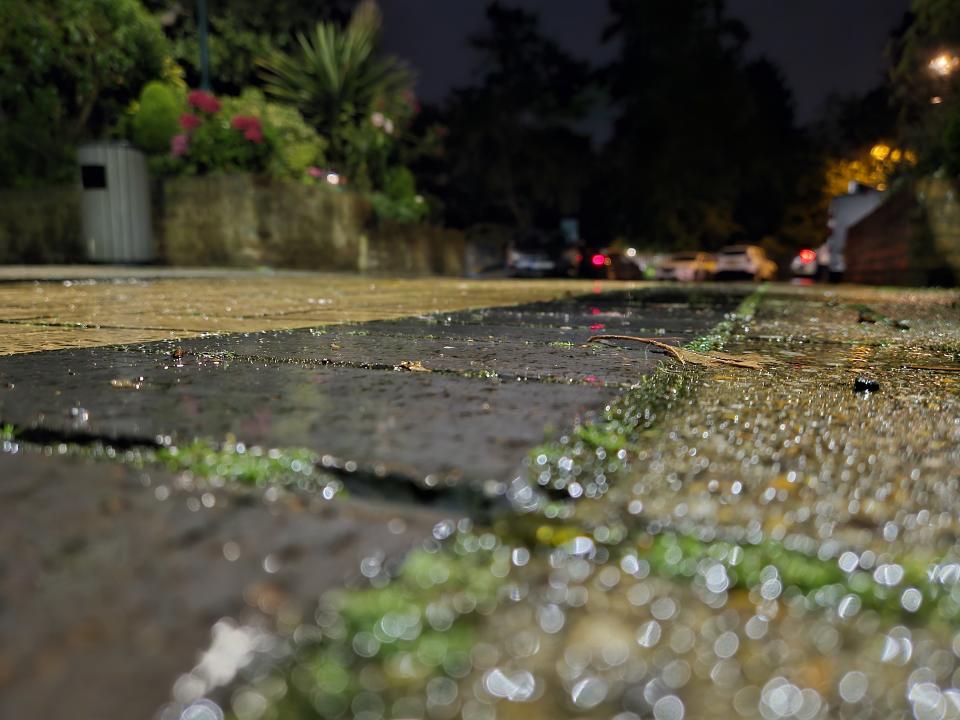
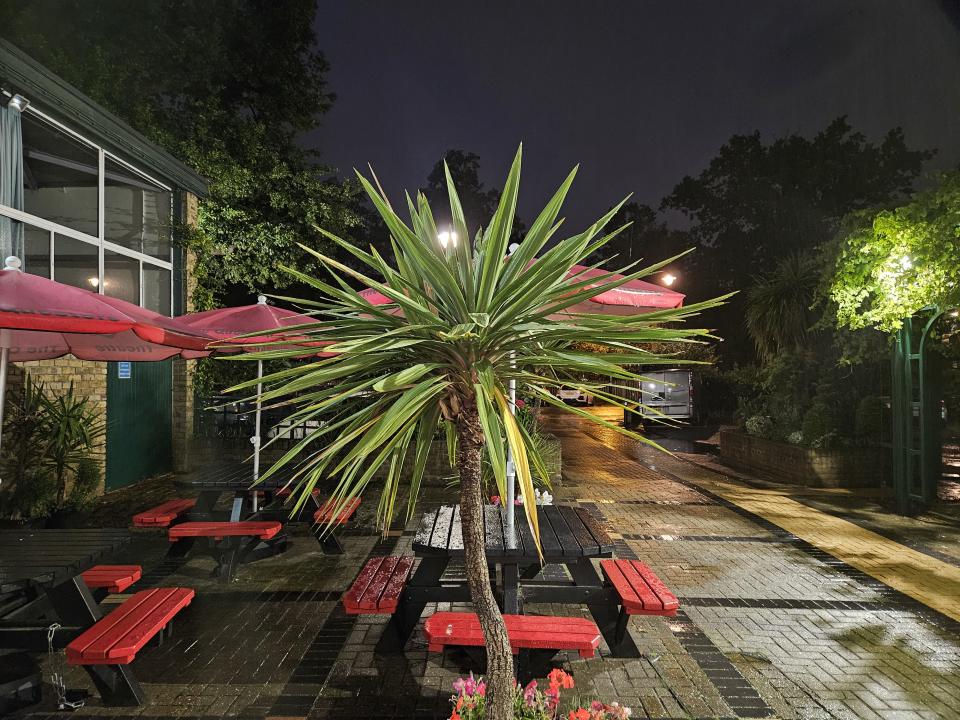
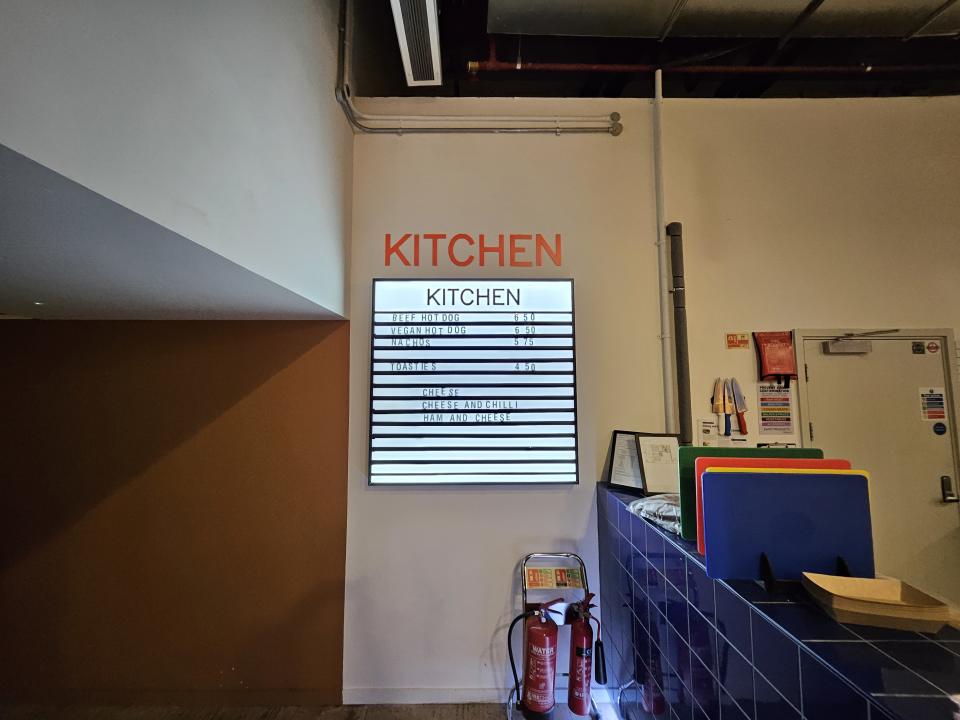
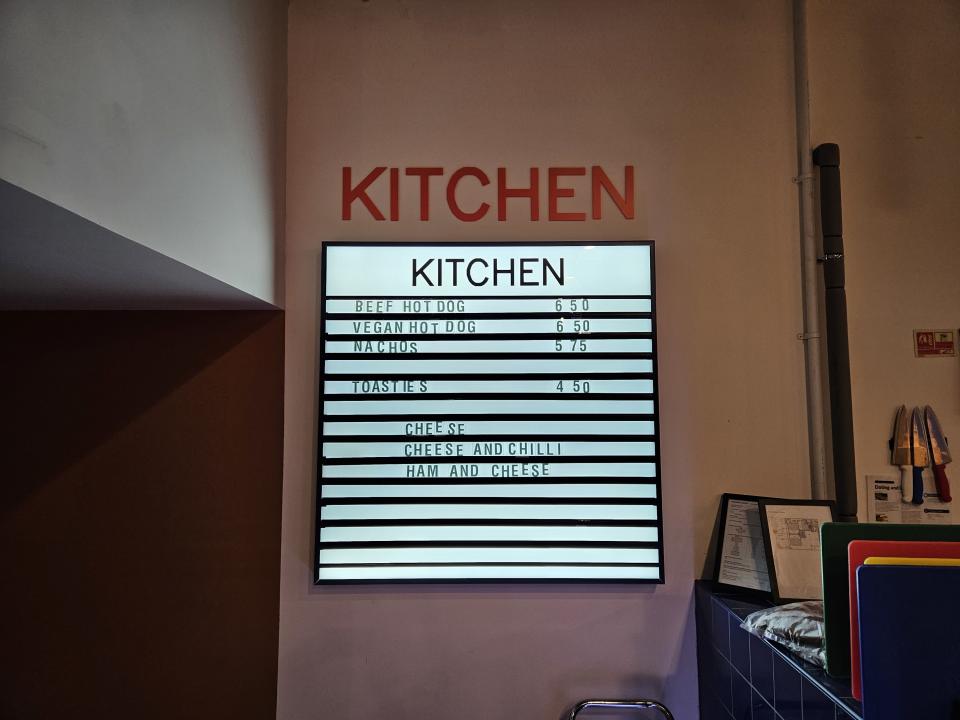
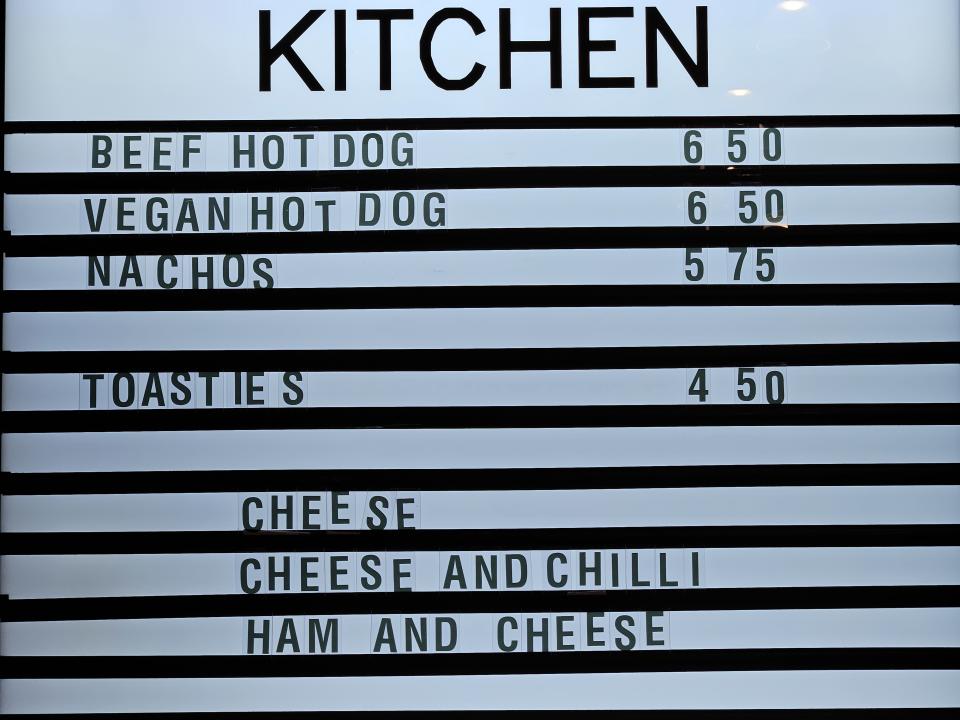
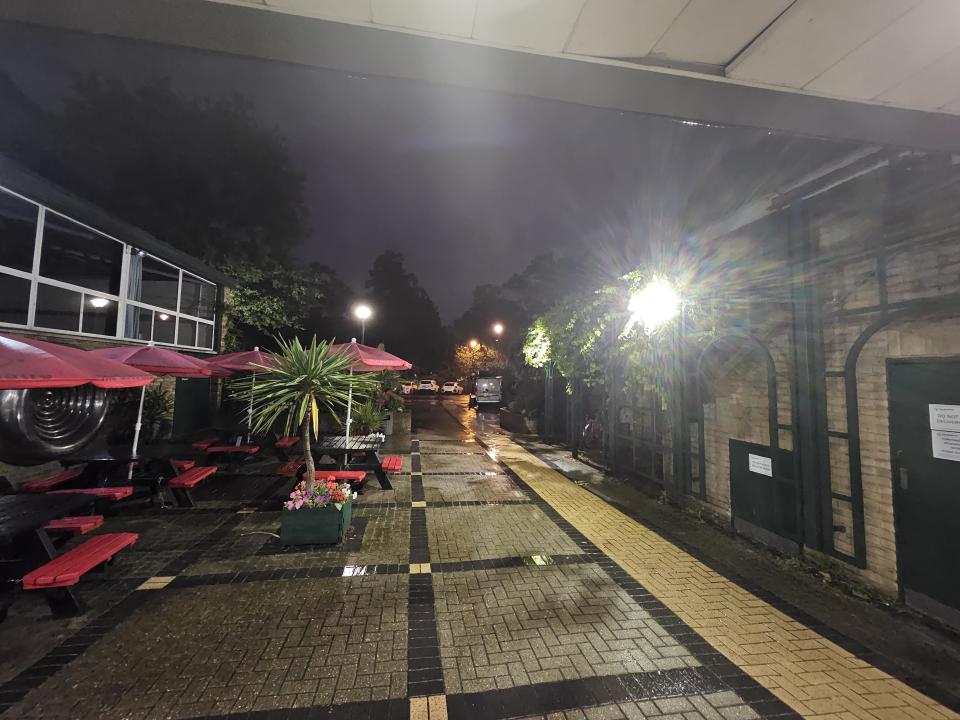
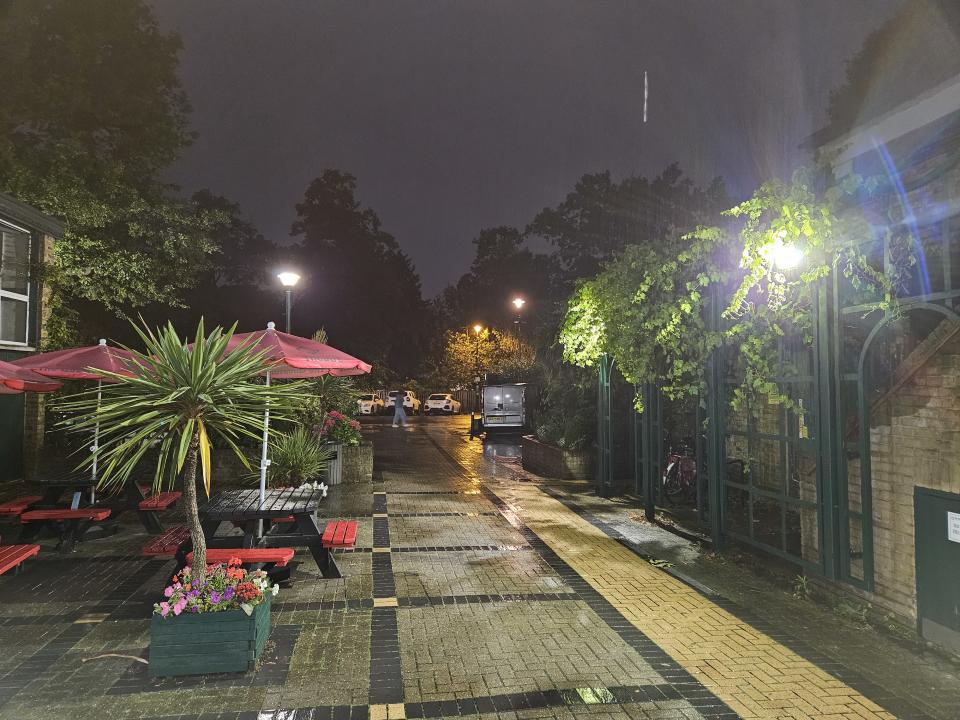
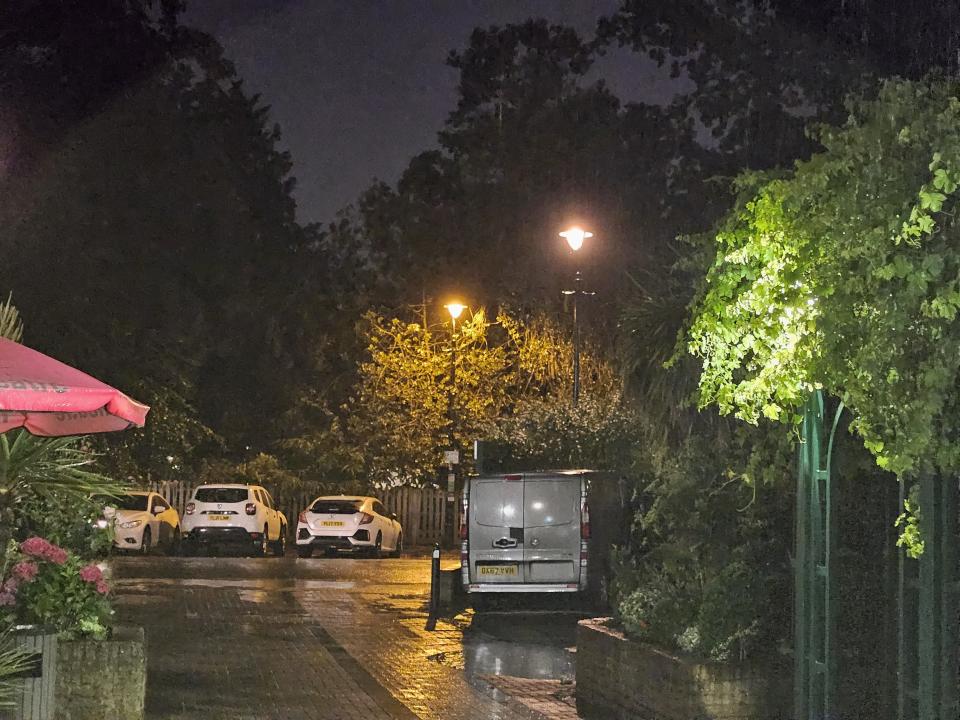
The ultra-wide and zoom cameras are also relatively weak, with modest sensor sizes and optics. Specifically, the ultra-wide misses out on autofocus, so it won't be great for nearby objects, and the 10MP zoom camera has a tiny sensor, so while it can focus impressively close to a subject – around 10cm – its image quality seldom wows.
The Z Fold 5's camera party trick is its Flex Mode. Part-fold the phone, set it down, and it acts as its own tripod of sorts, so you can really help the sensors along and capture some brilliant shots with a long exposure. Video shot on the Z Fold 5 also looks impressive, shooting at up to 8K 24fps, or 4K 60fps.
As for selfies, the under-display camera should be used for video calls only, as its photos are low on detail, especially in dimly-lit scenes. The cover screen selfie camera is better, but the best selfie experience comes from opening up the phone and using the cover screen and the primary 50MP sharp shooter.
Samsung Galaxy Z Fold 5 review: Verdict
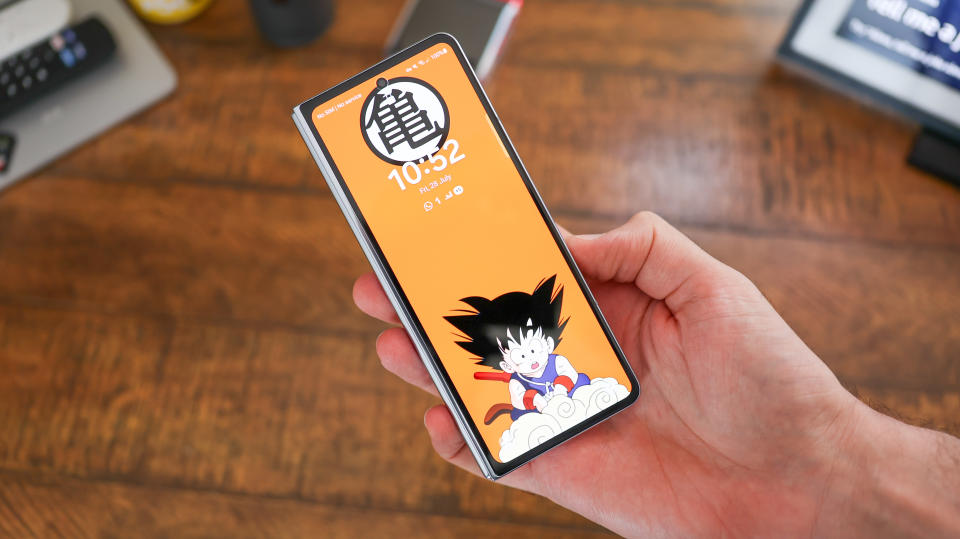
The Samsung Galaxy Z Fold 5 is ultimately a minor upgrade over the Z Fold 4. But it's a more polished package than the Google Pixel Fold or Honor Magic Vs – Samsung's main competition in the West – and it's also the only foldable with stylus input (albeit sold separately at additional cost).
So while no book-style foldable has nailed it yet, the Galaxy Z Fold 5 is the closest to it. With seriously solid build quality, bright screens, stacks of power, and a capable interface, not to mention day-long battery life, while it isn't a revelation, if you're looking to dip your toe in the book-style foldable waters, then it's still the one to beat... for now.
But can Samsung get away with another year of incremental Z Fold updates when it comes to the Z Fold 6 in 2024? Not with the way the competition is heating up. So while the Z Fold 5 is 'Best in the West' right now, it'll be fascinating to watch the foldable phone market progress in the not-so-distant future. And if you can't wait until then, this Samsung is the one to buy.
Also consider
Foldable options are limited in Western countries, with choices being the Google Pixel Fold, Honor Magic Vs, and Huawei Mate X3.
Google's Pixel Fold has a better camera system and a stock Android interface compared to Samsung's relatively busy One UI, as well as a more comfortable cover screen. Despite these wins, though, it's less powerful, with inferior heat management and build quality, and its simpler user interface isn't as capable. It also doesn't unfold flat.
The Honor Magic Vs is a great value option with loads of storage at a much lower price than the Z Fold 5, but an unoptimised tablet interface holds it back.
While the Huawei Mate X3 is hands-down the best foldable hardware available in the West, thanks to a lack of 5G and Google services holding it back, not to mention an even higher price than the Z Fold 5, it's a very niche alternative.
